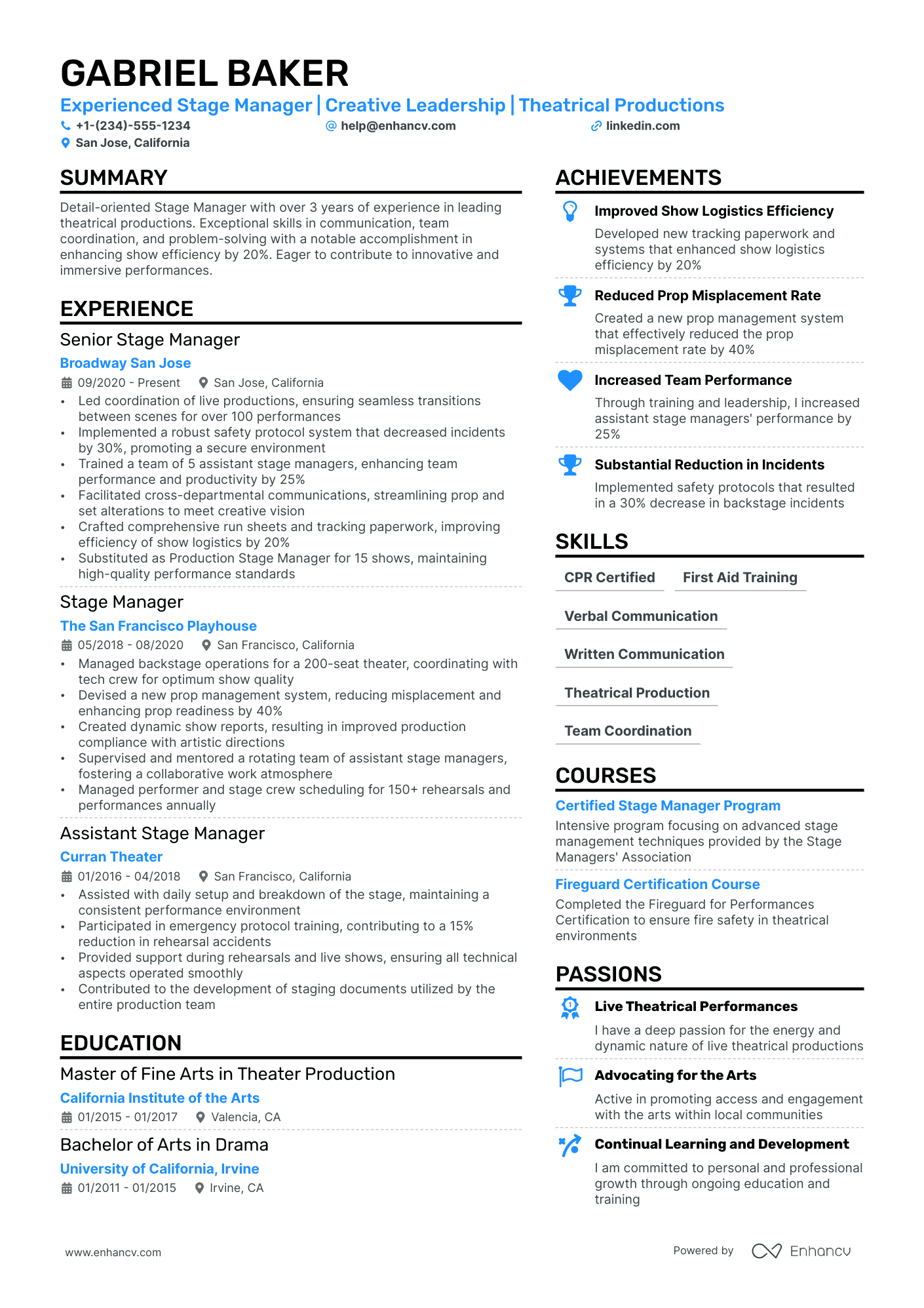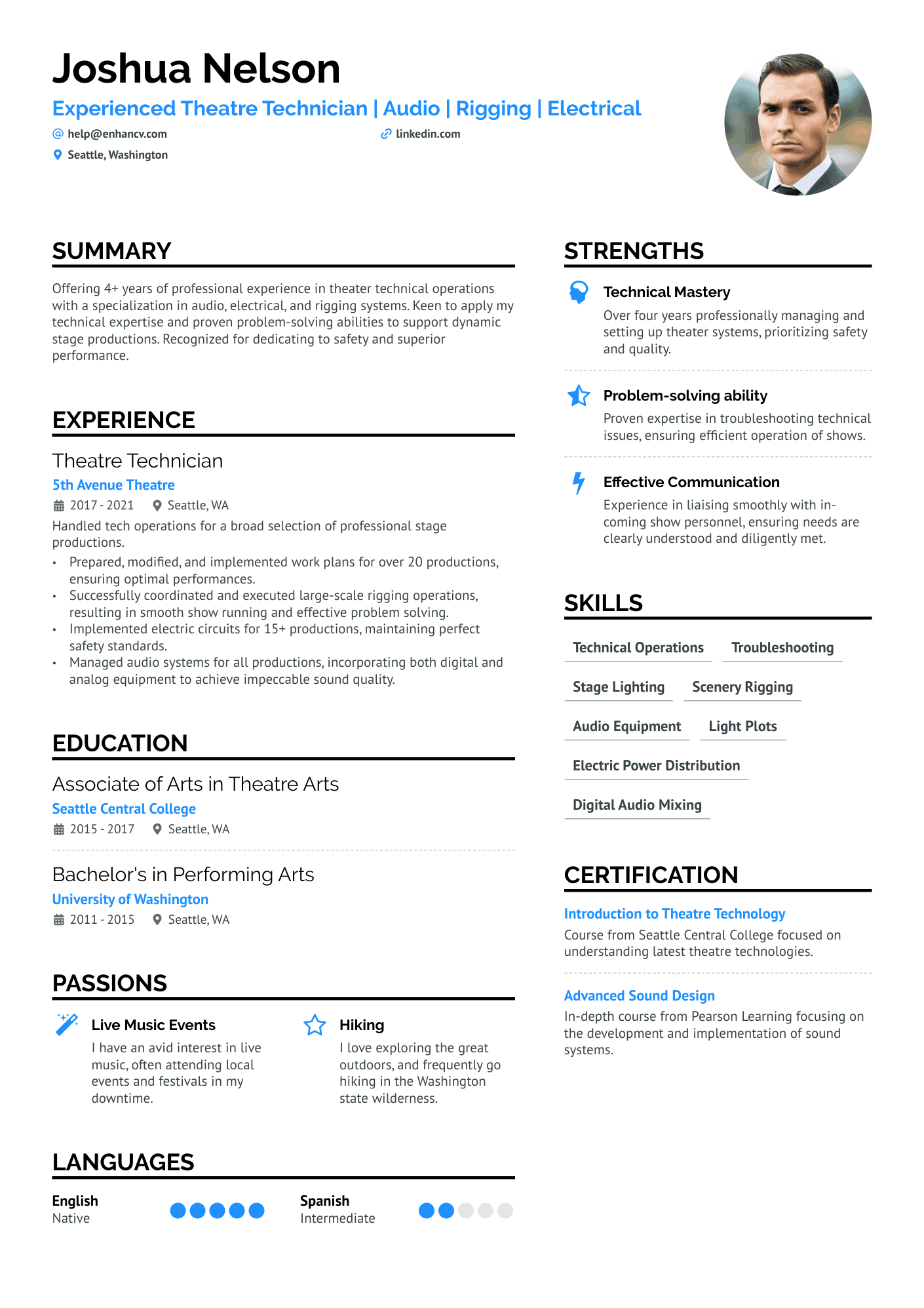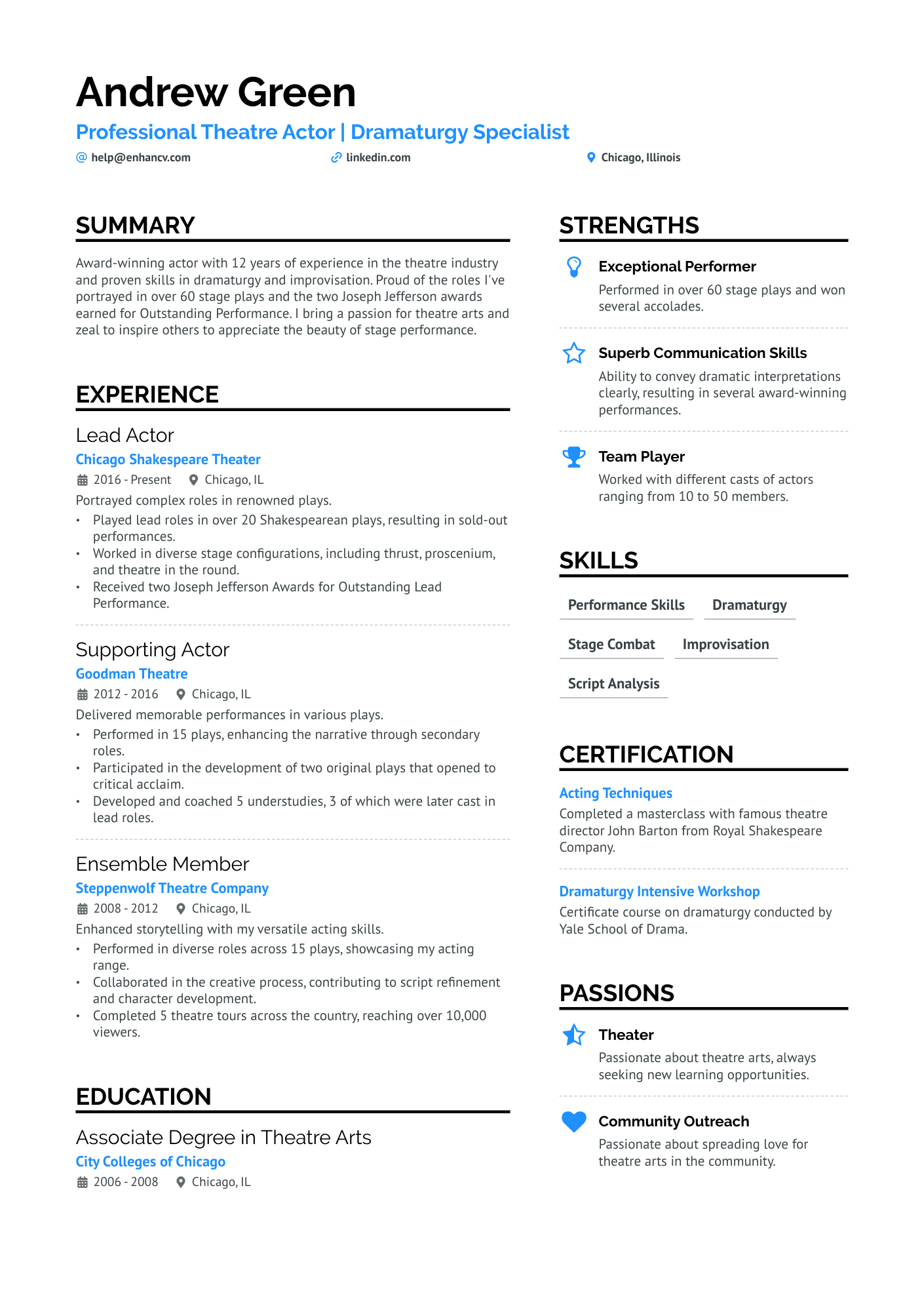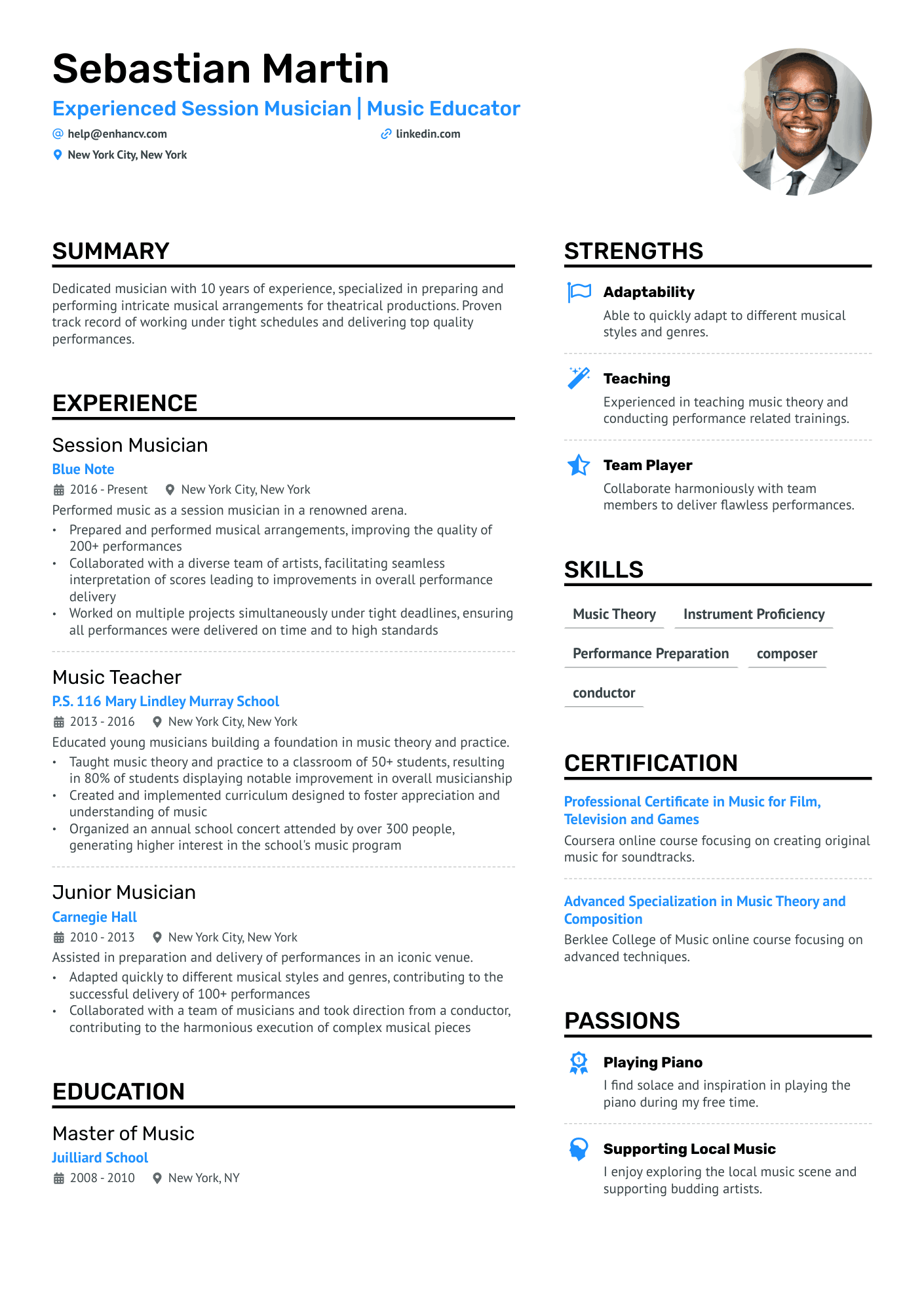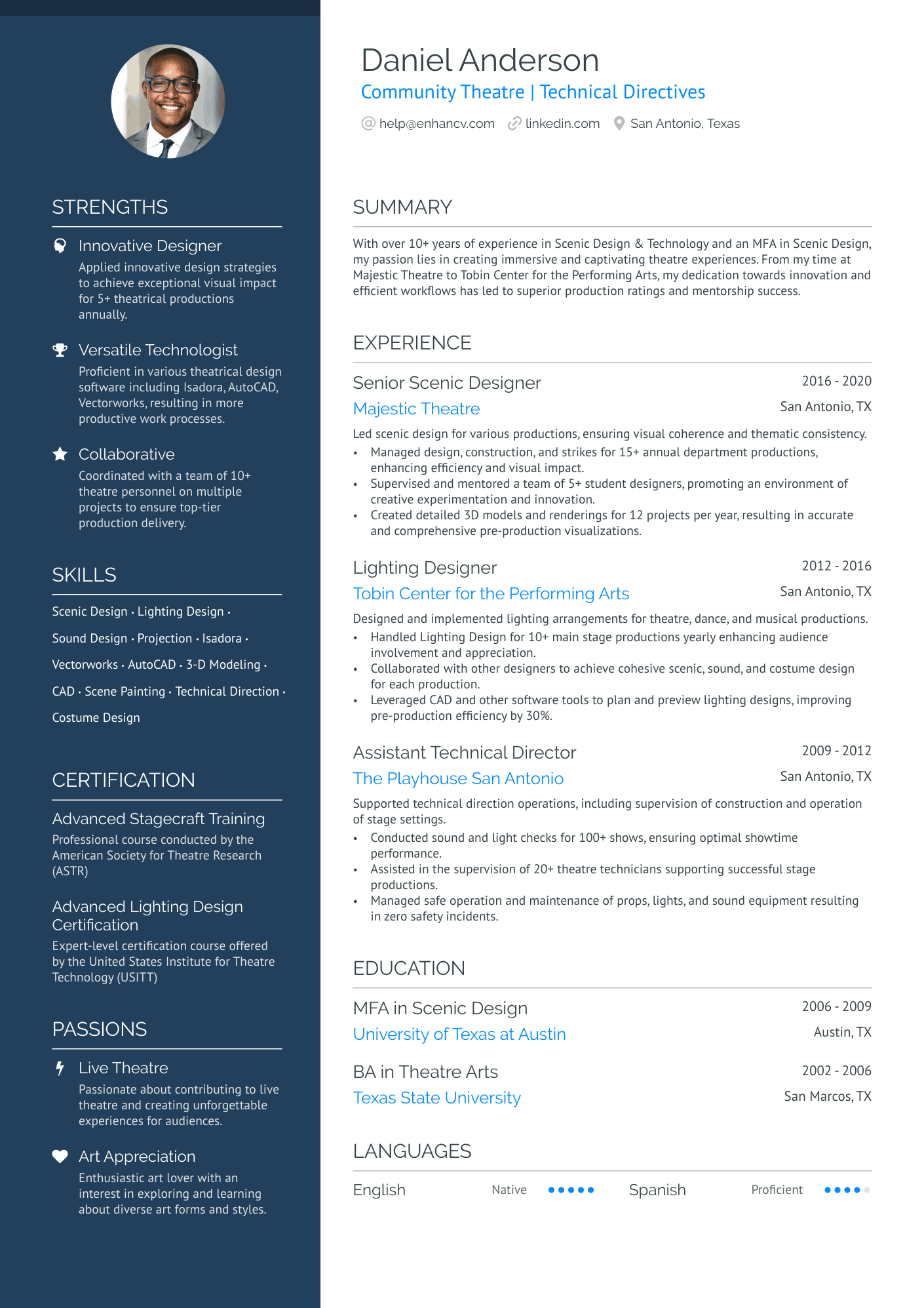Crafting a theater resume can be daunting due to the need to effectively showcase a diverse range of performances and skills. Our guide offers tailored strategies to help you highlight your stage experiences and talents, ensuring your resume strikes the right chord with casting directors.
- The most effective theater resume samples, reflecting on experience and skills.
- +10 simple, yet impactful methods to tailor your theater resume to the job advert.
- Using your professional achievements as the North Star to your unique value as a theater candidate.
- 'No one cares about your education nowadays …' Let's prove this statement wrong with the best-kept industry secrets to your education and certifications.
If the theater resume isn't the right one for you, take a look at other related guides we have:
The Ultimate Formula for Your Theater Resume Format
Our best advice on how to style your theater resume is this - first, take the time to study the job advert requirements.
The resume format you select should ultimately help you better align how your experience matches the specific role.
There are four crucial elements you need to thus take into consideration:
- How you present your experience. If you happen to have plenty of relevant expertise, select the reverse-chronological resume format to organize your experience by dates, starting with the latest.
- Don't go over the top with writing your resume. Instead, stick with a maximum of two-page format to feature what matters most about your profile.
- Headers aren't just for "decoration". The header of your resume helps recruiters allocate your contact details, portfolio, and so much more.
- The PDF format rules. It's the most common practice to submit your theater resume as a PDF so that your resume doesn't lose its layout. However, make sure the read the job well - in some instances, they might require a doc file.
Different markets have specific resume styles – a Canadian resume, for instance, may require a different approach.
Upload & Check Your Resume
Drop your resume here or choose a file. PDF & DOCX only. Max 2MB file size.
PRO TIP
Mention specific courses or projects that are pertinent to the job you're applying for.
Traditional sections, appreciated by recruiters, for your theater resume:
- Clear and concise header with relevant links and contact details
- Summary or objective with precise snapshot of our career highlights and why you're a suitable candidate for the theater role
- Experience that goes into the nuts and bolts of your professional qualifications and success
- Skills section(-s) for more in-depth talent-alignment between job keywords and your own profile
- Education and certifications sections to further show your commitment for growth in the specific niche
What recruiters want to see on your resume:
- Relevant performance experience - listing notable productions, roles, and the names of directors.
- Training and education - including acting classes, workshops, and any formal education such as a BFA in theater.
- Specialized skills - such as singing, dancing, stage combat, dialects, or instrument playing that are pertinent to theater performance.
- Recognition and awards - any notable accolades or achievements in the field of theater.
- Professional headshot - a current and high-quality headshot that accurately represents the actor's appearance.
Essential Tips for Crafting Your Theater Resume Experience Section
The experience section is indeed the core of your theater resume. It's where you present your past and current job roles. But how should you approach this crucial part?
A common error is treating the experience section as merely a list of job duties. Many candidates fall into the trap of detailing what they did without illustrating the impact of their actions.
To effectively write your theater resume experience section, consider these guidelines:
- Emphasize your achievements, supported by concrete metrics such as percentages, revenue increases, or customer satisfaction rates;
- Avoid using generic buzzwords like communication, hard work, or leadership. Instead, demonstrate how these skills added value in your previous roles;
- Begin each bullet point with a strong action verb, followed by a skill, and then the result of your actions;
- Tailor your resume for each job application by selecting the most relevant experiences, responsibilities, and successes.
We have an array of resume examples that illustrate how to optimally curate your theater resume experience section.
- Directed a series of five innovative plays, consistently increasing audience turnout by 35% year-over-year through targeted marketing and community engagement strategies.
- Negotiated, secured and managed $200,000 in funding for a cultural grant, which enhanced the theater's audio and visual capabilities significantly, broadening the range of productions possible.
- Implemented a talent development program that cultivated local actors and resulted in two individuals receiving national recognition for their performances.
- Coordinated with technical staff to produce seamless set transitions, contributing to a 40% increase in show efficiency and significantly reducing downtime between scenes.
- Developed a comprehensive stage management handbook that improved team communication and cut rehearsal times by 25%, aligning with the company's objective to optimize production schedules.
- Guided a diverse cast of 30 performers through a rigorous rehearsal schedule for a sold-out run of a contemporary adaptation of Shakespeare's 'Macbeth'.
- Overhauled the theater's digital ticketing system, leading to a 20% uptick in online sales, and greatly enhancing the customer experience for show selection and seat reservation.
- Spearheaded a collaborative partnership with local schools, creating an educational program that introduced theater to 1,500+ students, increasing community involvement and theater attendance.
- Expertly balanced the annual budget of $4 million, ensuring optimal allocation of funds across production, marketing, and maintenance, while maintaining high-quality performances.
- Facilitated the technical direction for 15 large-scale musicals, which drew in crowds exceeding 3000 per show, necessitating expert crowd management and facility coordination.
- Designed and executed an immersive lighting and sound plan that received critical acclaim and was replicated in subsequent national tours, serving as a benchmark for the industry.
- Cultivated a network of industry professionals which introduced revolutionary technologies, such as holographic set pieces, elevating the theater's reputation for innovation.
- Oversaw the revitalization of a historic landmark theater, managing an extensive $5M renovation project that preserved the cultural heritage while integrating modern amenities.
- Launched a highly successful summer theater festival that became an annual event, driving a 50% increase in out-of-town visitors and a corresponding boost in local business revenue.
- Cultivated a strong company culture among staff by initiating team-building exercises and professional development workshops that decreased staff turnover by 30%.
- Established a new play development program that supported emerging playwrights, leading to the debut of 10 original works, two of which received national awards for playwriting excellence.
- Expanded the outreach program to include virtual reality experiences of past productions, which drove an additional revenue stream and increased accessibility for global audiences.
- Orchestrated a rotating repertory model that maximized stage utilization, enabling a 60% increase in the number of annual productions without compromising quality or audience satisfaction.
- Curated a dynamic season lineup to include foreign language plays with subtitles, tapping into new demographic markets and leading to a 30% surge in subscription memberships.
- Implemented a customer feedback system that informed a re-design of the concession area, resulting in improved service times and a 25% increase in concession sales.
- Negotiated high-profile celebrity guest appearances in key productions, contributing to extensive media coverage and sold-out performances throughout the entire run.
- Pioneered the theater's first-ever bilingual play series, attracting a 22% increase in engagement from non-English speaking communities and fostering cultural diversity within the theater-goer demographic.
- Developed a sustainability initiative for theater productions, reducing material waste by 40% while maintaining artistic integrity and saving an average of $15,000 per production.
- Cultivated partnerships with local businesses for cross-promotions, resulting in $100,000 in sponsored materials and services for the theater season.
Quantifying impact on your resume
- List the number of productions you've worked on to demonstrate experience and versatility.
- Include the seating capacity of theaters to give a sense of the scale of productions and audiences you've managed.
- Mention the percentage increase in ticket sales or attendance during your tenure to show your impact on business growth.
- Quantify the budget you've managed for productions to exhibit your financial responsibility and resource allocation skills.
- Detail the number of cast and crew members you've coordinated to highlight leadership and team management.
- Specify the number of awards or nominations received to underscore the quality and success of the productions you've been involved with.
- Note the number of new processes or systems you've implemented to showcase innovation and efficiency improvements.
- Record the amount of money you've saved the theater through cost-cutting measures, demonstrating financial acumen.
Action verbs for your theater resume
How to shift the focus from your theater resume experience section to your professional profile
If you're at the start of your career journey or transitioning industries, you might be concerned about the lack of professional experience while crafting your theater resume.
How can you effectively present your theater resume experience section under these circumstances?
Rather than a traditional, extensive experience section, demonstrate your expertise through:
- Emphasizing your education. Your academic background might impress recruiters, especially if it includes recent, industry-relevant knowledge;
- Creating a compelling objective statement. The first few sentences of your resume should map out your motivations and career aspirations, offering insight into your goals;
- Highlighting your transferable skills. For example, if you've honed communication skills through volunteering, illustrate on your theater resume how these can benefit a potential employer;
- Detailing your technical background in certifications and skills sections. As a recent graduate, your technological foundations might be particularly attractive to employers looking to develop these skills further.
It's important to remember that employers sometimes prefer candidates with less experience but who are a better cultural fit for their organization.
Recommended reads:
PRO TIP
If you happen to have some basic certificates, don't invest too much of your theater resume real estate in them. Instead, list them within the skills section or as part of your relevant experience. This way you'd ensure you meet all job requirements while dedicating your certificates to only the most in-demand certification across the industry.
The Right Balance Between Hard Skills and Soft Skills for Your Theater Resume
Wondering what the perfect theater resume looks like? The candidate's profile meets job requirements by balancing both hard skills and soft skills across their resume.
- Hard skills are all the technologies you're apt at using . Prove you have the right technical background by listing key industry hardware/software in your theater resume skills section and noteworthy certifications.
- Soft skills are both your personal, mindset, communication, analytical, and problem-solving talents . Use your theater resume achievements section to show how you've used a particular soft skill to reach a tangible outcome.
When writing about your unique skill set, always make sure to refer back to the job advert to see what are the key requirements. This ensures you've tailored your resume so that it matches closer to what the ideal candidate profile is.
Top skills for your theater resume:
Stage Lighting Design
Sound Engineering
Set Construction
Costume Design
Scriptwriting Software (e.g., Final Draft)
Video Projection Systems
Stage Management Tools (e.g., QLab)
Props Creation and Management
Makeup Techniques for Performance
Theater Management Software
Collaboration
Creativity
Time Management
Adaptability
Communication
Problem-Solving
Leadership
Attention to Detail
Conflict Resolution
Critical Thinking
PRO TIP
List all your relevant higher education degrees within your resume in reverse chronological order (starting with the latest). There are cases when your PhD in a particular field could help you stand apart from other candidates.
The Basics of Your Theater Resume Certifications and Education Sections
Improve the education and certification sections of your theater resume by:
- Dedicating more prominent space to certificates that are more recent and have helped you update your skill set
- Keeping all the information you list to the basics: certificate/degree name, institution, and graduation dates
- Writing supplementary information in the details of your certification or education section, only if you lack experience or want to show further skill alignment
- Including your credential or license number, only if the information is valid to your application or certification
Within theater job adverts, relevant education, and certification are always listed within the key prerequisite for the role.
Ensure you meet all job requirements with some of the leading certificates in the industry:
The top 5 certifications for your theater resume:
- Entertainment Technician Certification Program (ETCP) - Electronic Theatre Controls (ETC)
- Technical Theatre Certification (TTC) - US Institute for Theatre Technology (USITT)
- Certified Theatre Educator (CTE) - Educational Theatre Association (EdTA)
- Associate in Theatrical Production (ATP) certification - National Association of Schools of Theatre (NAST)
- Adobe Certified Expert (ACE) - Adobe
PRO TIP
Showcase any ongoing or recent educational efforts to stay updated in your field.
Recommended reads:
Your Theater Resume Top One Third: Choosing Between a Resume Summary Or an Objective
The top third of your resume is crucial, as recruiters might focus only on this section rather than reading the entire document. Therefore, it's important to carefully decide whether to include a resume summary or an objective.
- The resume summary encapsulates your most significant experiences, key achievements, and skills in the field. Ideal for candidates with substantial relevant experience, the summary previews what recruiters will find in the rest of your resume.
- The resume objective outlines your professional aspirations. It describes your career goals for the coming years and how you envision your role evolving in the prospective company. The resume objective is suitable if you have less professional experience and wish to emphasize various soft skills such as motivation, vision, and planning.
Explore some of the best examples of resume summaries and objectives from real-life professional resumes in the industry.
Resume summaries for a theater job
- With over a decade of leading roles in Broadway productions, this seasoned actor has honed a diverse repertoire, from Shakespearean tragedies to modern musicals. Technically proficient in stage combat and vocal performance, their portrayal of Hamlet garnered a prestigious Tony Award nomination.
- As a former professional dancer with the New York City Ballet, this performer brings 8 years of discipline and artistic excellence to the theater. Transitioning into acting, they possess a strong foundation in movement and have been praised for their evocative performances in experimental plays.
- Embarking on a new journey in theater, this marketing executive of 15 years possesses a remarkable ability for storytelling and public speaking. Keen to meld their business acumen with a passion for drama, they seek to bring a fresh perspective to character development and narrative expression.
- A recent graduate from The Juilliard School with a specialization in theatrical direction, eager to apply a robust 4-year academic foundation and intern experience. Driven by a passion for innovative stagecraft, they have already directed a critically acclaimed student production which won the university's directorial prize.
- Eager to immerse themselves in the world of theater, this enthusiast with no prior industry experience is armed with a zeal for performance art and a bachelor's degree in literature. Intent on leveraging their understanding of complex narratives and character studies to excel in dramatic roles and contribute to compelling storytelling.
- With an upbringing enriched by community theater participation but no formal experience, this individual is determined to cultivate a professional acting career. Their objective is to apply a lifelong affinity for performance, a quick-learning disposition, and an infectious enthusiasm to captivate audiences and colleagues alike.
Extra Theater Resume Sections and Elements
Creating a winning theater resume isn't about following a rigid formula. The key is to tailor it to the job requirements while maintaining your unique personality.
Consider including these additional resume sections to enhance your profile:
- Awards - Highlight industry-specific awards as well as any personal accolades to demonstrate recognition of your expertise and achievements;
- Hobbies and interests - Share your interests outside of work. This can provide insights into your personality and indicate whether you'd be a good cultural fit for the organization;
- Projects - Detail significant projects you've been involved in, focusing on your contributions and the outcomes;
- Publications - If you've authored or co-authored academic papers or other publications, include them to establish your credibility and in-depth knowledge of the field.
These sections can give a more comprehensive view of your capabilities and character, complementing the standard resume content.
Key Takeaways
- Pay special attention to the tiny details that make up your theater resume formatting: the more tailored your application to the role is, the better your chances at success would be;
- Select the sections you include (summary or objective, etc.) and formatting (reverse-chronological, hybrid, etc.) based on your experience level;
- Select experience items and, consequently, achievements that showcase you in the best light and are relevant to the job;
- Your profile will be assessed both based on your technical capabilities and personality skills - curate those through your resume;
- Certifications and education showcase your dedication to the particular industry.
